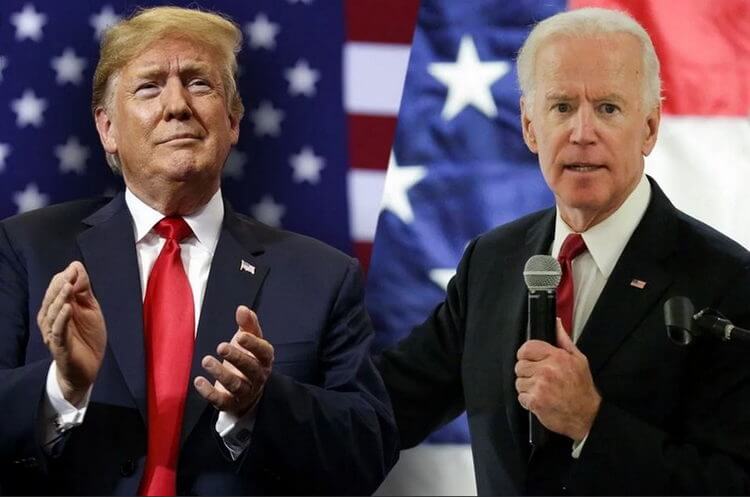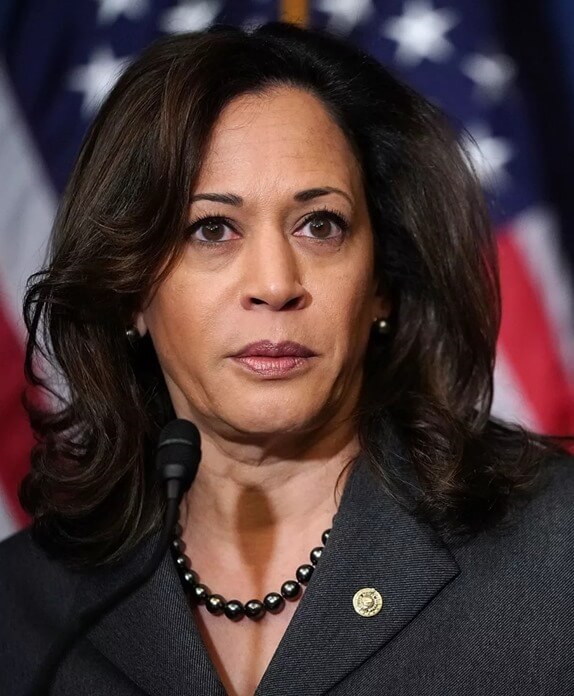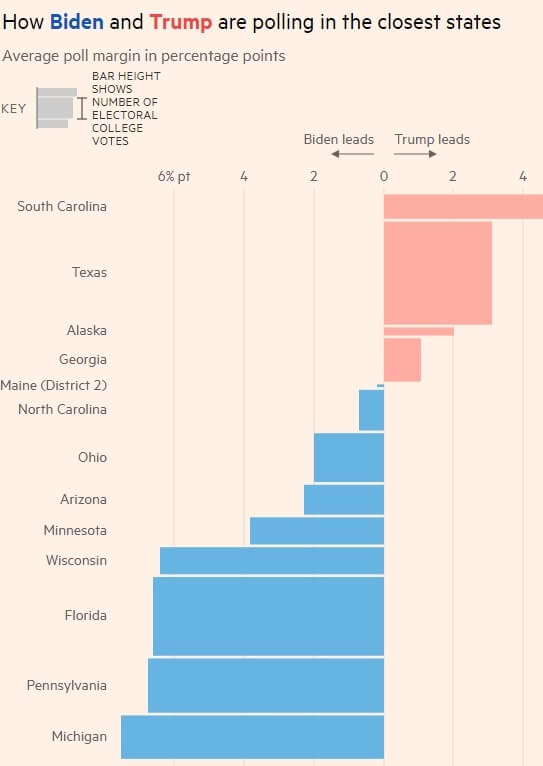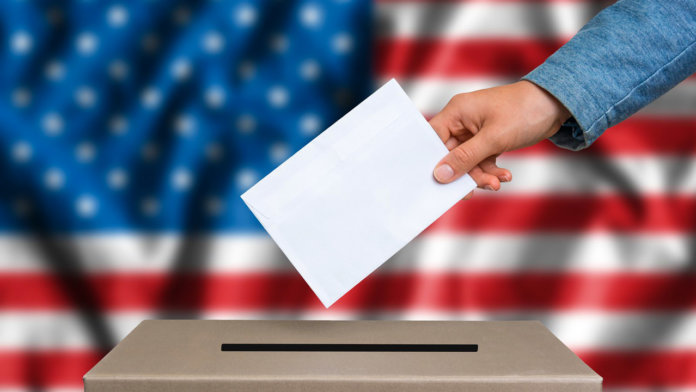We have already written about how the US presidential election November 3 this year, and who is eligible to participate. And in this review, we will take a closer look at the rating of US presidential candidates in the 2020 elections.
Biden vs Trump

Biden's biggest advantage may be that most Democratic voters see him as the most likely winner. The majority (57%) of Democratic voters believe that it is Biden who can win the general election against President Trump, and only 19 percent believe that he will lose.
As for the most likely favorite from the Republican Party - Donald Trump - the main factor that positively affects his rating is the US economy. The unemployment rate during his presidency fell to a 50-year low of 3.5 percent. And the inflation rate as of 2019 was less than 2 percent, so prices are not rising rapidly. Consequently, public opinion about the state of the economy is favorable.
Trump is catching up with Biden in popularity

Joe Biden's lead over Donald Trump has narrowed significantly, according to a CNN poll conducted by SSRS from August 12 to 15 of 1,108 American adult voters.
According to experts, the reduction in the distance between Biden and Trump is due to the fact that the wave of protests is declining, and the economy has begun to recover from the coronavirus pandemic. In addition, Trump is active both in the international arena and in issues directly related to the United States.
Shortly before the party conventions, 53% of the poll participants said they were very enthusiastic about voting in elections. This keen interest has been a new high in CNN polls since the 2003 presidential campaign.
- Overall, 50% of registered voters lean towards Biden-Harris, while 46% of respondents support Trump and Michael Pence.
- The 72% of voters who said they were particularly enthusiastic about the 2020 US presidential election predominantly support Biden (53% of the vote for him and 46% for Trump, respectively).
- However, the gap between Biden and Trump is narrower among voters in the states with the most impact on the electoral college this fall.
Trump has bolstered his position with Republicans and Conservatives. If in June 8% of Republicans said they would support Biden, now this figure is only 4%. Among conservatives, the share of those who approve of Trump's candidacy has increased from 76% to 85%.
But a CNN poll also shows Trump voters are slightly more likely to change their minds by November (12% said this) than Biden's supporters (7%). In addition, white seniors - the group that helped Trump win in 2016 - are showing signs of disapproval of the president's actions over the pandemic.
The proportion of voters who disapprove of the way Trump acts as the country's leader exceeds the proportion of those who approve (54% and 42%, respectively).He is an underdog in the approval rating of presidents who ran for re-election, shortly before their nomination at a party convention.
It is inferior in popularity:
- Barack Obama with his 48% approval,
- George W. Bush, for whom 49% of Americans were ready to vote according to the results of election polls,
- Bill Clinton with a 53% rating,
- and Ronald Reagan (54% approval).
Perhaps the consolation of the frantic Donald is that he is still ahead of Jimmy Carter with 33% approval and George W. Bush (35%).
Kamala Harris is one of the keys to Biden's popularity
 The choice of the future vice president in case of victory of Joseph Biden is rated by a majority (52%) as excellent or quite good, and 57% of voters believe that this will favorably affect Biden's ability to make important presidential decisions. Most believe that Kamala Harris can even be president if necessary (57%). And the majority (62%) believe that her choice did not greatly affect how they vote.
The choice of the future vice president in case of victory of Joseph Biden is rated by a majority (52%) as excellent or quite good, and 57% of voters believe that this will favorably affect Biden's ability to make important presidential decisions. Most believe that Kamala Harris can even be president if necessary (57%). And the majority (62%) believe that her choice did not greatly affect how they vote.
However, among black people there are more of those who believe that Harris's choice will make them support Biden (such answers were 28% among the surveyed colored population and 18% among whites).
In which states is Biden leading, and in which ones is Trump?
 Less than three months away from the U.S. presidential election, former Vice President Joe Biden, the official Democratic nominee, is ahead of incumbent Republican President Donald Trump in key states with some of the hottest campaign battles.
Less than three months away from the U.S. presidential election, former Vice President Joe Biden, the official Democratic nominee, is ahead of incumbent Republican President Donald Trump in key states with some of the hottest campaign battles.
- In Florida, where the number of Covid cases remains high, Biden is 6 percentage points ahead of Trump.
- Likewise, Biden has a slight edge in Arizona, a state that has only one Democratic presidential candidate won over the past 70 years.
- In Texas, a typical Republican-colored red state, the poll difference between the two presidential contenders is less than 5 percentage points, suggesting a head-to-head race in November.
- In Pennsylvania, in terms of polls, the situation is similar to Florida. Biden had a slight advantage over Trump - 48% and 45%, respectively, on average in polls at the end of February. Now Biden is leading by votes - 50% versus 43% for Trump. Note that Pennsylvania is a traditionally democratic state, Biden's headquarters are located there, and he campaigns there personally.
- Colorado moved sharply in the direction of Biden when the coronavirus took on a full blown nature. Biden's lead in polls increased by 12 percentage points, leaving Trump far behind his rival - 39% versus 53% for Biden.
If all the states leaning towards Biden go his way this fall, he will get more than enough electoral votes to win the presidency.
Trump's staff believes his strength is underestimated in polls. And polls have shown that even where Biden is ahead of the current American leader, voters think Trump will do better than current polls suggest.
Biden’s headquarters also expects the race to get tougher, especially if Trump is seen to be at least slightly better at dealing with the problems caused by the coronavirus as fall approaches.
But right now, in order for the president to win re-election, he will have to win all the current draws and convince those states that lean towards Biden to vote for himself. This is not to say that this is an unattainable task, because Trump did the same in 2016, when Hillary Clinton was his main rival.
Who dropped out of the 2020 US election race
From the Democratic Party:
- Elizabeth Warren.
- Pete Buttigieg.
- Amy Klobuchar.
- Michael Bloomberg.
- Joe Sestak.
- Kamala Harris.
- Marianne Williams.
- Andrew Young.
- Michael Bennett.
- Bernie Sanders.
- Tulsi Gabbard.
After the primaries, only one heavyweight Democrat remained on the political platform - Joe Biden. He became the official candidate for the Democratic Party.
From the Republican Party:
- Joe Walsh.
- Mark Sanford.

